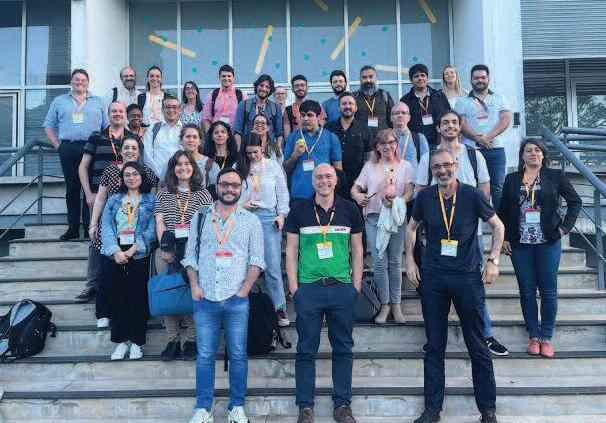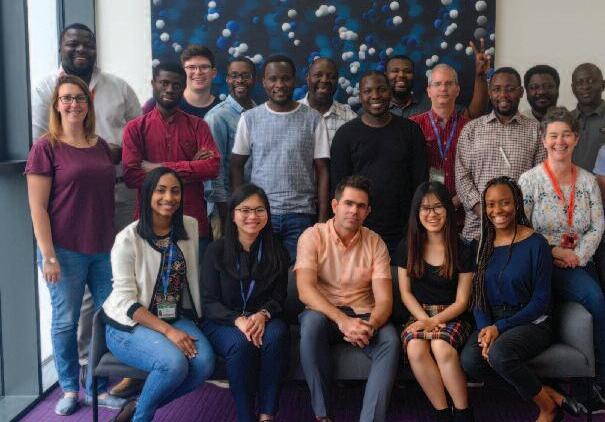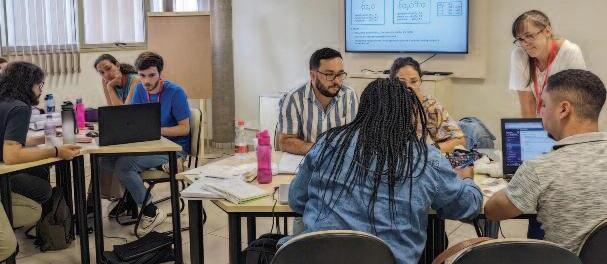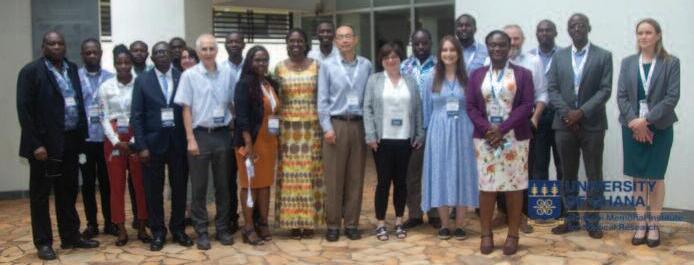
9 minute read
6 years of WCAIR Training programme
The aim of the WCAIR training programme is to support capacity building for drug discovery in the low- and middle-income countries most affected by the diseases we research. Training has been split into three main categories – training in Dundee, short courses and online content, and partnerships.
WCAIR Trainees in Dundee
Advertisement
Since January 2018, we have delivered 279 months of training in Chemistry, Biology, DMPK and Parasitology This training has been delivered to 38 trainees, from 15 different countries
Each programme is designed to suit the individual trainee, based on their pre-existing skillset and their research. While the trainees have access to our labs and associated equipment, we are mindful that these are unlikely to be available at their home institute Great care is taken to train them with techniques that will be applicable in their own institution and skills that they can pass onto colleagues

WCAIR Training team and trainees 2019
We ensure that they have as rounded an experience as possible with the opportunity to learn about all aspects of drug discovery research This is achieved through group seminars, access to our undergraduate modules in drug discovery and access to the seminars and lectures available to all WCAIR staff
To maintain links and help the trainees implement their new skills when they return to their home institutions, they can apply for small project grants (up to £30K) to continue collaborating with WCAIR
Short Courses

Uruguay 2022
In collaboration with the Wellcome Connecting Science team, we have run the ‘Practical Aspects in Small Molecule Drug Discovery’ for over a decade. In 2019 we took the course to University of Cape Town where it was open to scientists from the African continent only Funded places removed financial barriers to attendance, allowing 26 participants from 19 institutes from 11 different countries to attend. After a long delay due to travel restrictions, we ran the course again in South America in November 2022 with support from the Institut Pasteur de Montevideo, Uruguay 24 participants from 9 different countries attended that course from South and Central America
The WCAIR training team have designed a number of new short courses. Making use of the improved online webinar and collaborative tools developed through the COVID pandemic, these have been created to be delivered online, thus reducing financial barriers for researchers from disease endemic countries to participate The courses cater to a variety of needs; some provide an overview of drug discovery, while others focus on a specific topic. For each course, we set up a Slack group so that participants can continue to discuss content and ask us questions, also allowing them to collaborate with each other Online programmes are all recorded so that individuals can rewatch the content The full list of courses can be found at https://wcair.dundee.ac.uk/training/short-courses/ They will all be running in 2023 Examples include:
Target to Candidate: An Introduction to Drug Discovery is designed to give scientists a flavour of how a drug project moves from idea to pre-clinical candidacy It highlights how to start and progress a drug discovery campaign with real life examples from experts working in this area of science, both academia and industry. This programme has run twice with collaborators in South Africa and Brazil, both online due to travel restrictions
Medicinal Chemistry 101 and DMPK 101 are online programmes, made up of 12 sessions, once a week for 1.5 hours. Designed for chemists and pharmacologists respectively, they each cover key concepts those working in these disciplines within drug discovery need to understand to be successful
Drug Discovery Mission has been delivered 4 times, both in person and online. It has been designed as an interactive tool to support the understanding of the processes involved in drug discovery It exposes participants to all aspects of the pre-clinical drug discovery process Regardless of discipline, scientists will be asked (as a team) to make critical analytical decisions and conclusions based on the data presented to them. The programme has been designed to support learning scientific content, but also to promote team working and highlight the multi-disciplinary nature of drug discovery

Online Content
We are aware it is not possible for everyone to attend training in Dundee, or even have the opportunity to attend a short course To cater for this group, we have developed some free resources. Content ranges from short written pieces on drug discovery in general, but also includes some short talks on topics such as medicinal chemistry and DMPK. There are helpful hints in the form of Padlets (a way of grouping useful free-to-access resources) and workshops on data management From a more practical perspective, we have included some ‘how to’ sections, showing people how to do specific assays and a series of videos showing chemistry experimental set ups. We have also developed short animations to help people understand the concepts of absorption and metabolism All online content is available for free at https://wcair.dundee.ac.uk/training/training-resources/
Partnerships
Dialogue with our trainees has helped us understand where our support can make most of a difference in their home countries With this in mind we are focusing our resources at a few strategic partnerships.
Ghana. We are focusing our efforts on Ghana as there are several institutes working in drug discovery, and they have some infrastructure in place already Following visits in 2019, we are acting as a coordinator to bring interested institutes together to form a drug discovery hub. See ‘Focus on Ghana’.
Brazil. We have had scientific collaborations in Brazil for several years, so it is a natural choice within South and Central America Much of the support that Brazil needs is in terms of training rather than infrastructure A Newton Fund (MRC-FAPESP) award allowed us to work with 3–4 partner institutes in São Paulo state and deliver a training course to their staff (Target to Candidate: An Introduction to Drug Discovery) We have recently delivered a Drug Discovery Mission programme to a group of 10 chemists with support from University of São Paulo, Ribeirão Preto campus Malawi.
Malawi. There are strong links between Scotland and Malawi at a governmental level coordinated by the Scotland-Malawi Partnership. Wellcome also invest in research through the Malawi-Liverpool-Wellcome Trust Clinical Research Programme and the Wellcome Centre for Integrative Parasitology, University of Glasgow Our partnership with Kamuzu University of Health Sciences, Blantyre compliments these existing projects We have delivered 2 weeks of intense practical training at the College in 2018 and 2019 A technician from the College worked with us for 6 months in Dundee, and he helped develop and deliver a training programme to his colleagues on plant extraction techniques This series of workshops was designed to be delivered to MSc students and we hope to develop more sets of workshops around the drug discovery theme.
Focus on Ghana
Building on visits in 2019, WCAIR partnered with several academics in Ghana to start developing a joint research portfolio These were small pots of money from the University of Dundee Global Challenges Research Fund (GCRF) There were two projects, one on anti-malarial chemistry, and the other a project on Cryptospordium parvum, both of which were with the University of Ghana Building on these awards, the scientists we worked with wanted to bring everyone working in drug discovery together Funding from the Academy of Medical Sciences allowed a network to be developed. We now support several working groups who each have their own agendas to take forward e g the analytical chemistry group would like to develop training for technical staff as well as establish structural elucidation support. As well as individual scientific goals, the groups want to be able to further the understanding of the entire drug discovery process within the academic institutes of Ghana
The next step was to help support the relevant parties to develop a working drug discovery network in country There were groups working on parts of drug discovery but no coordinated work We supported the University of Ghana and KNUST (Kwame Nkrumah University of Science and Technology) with an application to the Bill & Melinda Gates Foundation This bid was successful, and the award began in February 2022
Once travel restrictions allowed, we held a meeting in Ghana, which served as the final meeting of the Academy of Medical Sciences networking award, and the launch of the Ghana Drug Discovery Hub This meeting allowed all the partners of the Gates Foundation award to meet in Ghana and for some this was the first time they had been in Ghana to see the facilities
In the first year of the award, the team in Ghana have been working incredibly hard. They have synthesised over 100 new compounds, and these are now able to be tested in a malaria parasite assay in Ghana rather than being sent overseas. The next major milestone will be the establishment of a Drug Metabolism and Pharmacokinetics (DMPK) facility in KNUST They have one assay running but are waiting on delivery of a new LC-MS-MS unit for the remaining assays. Once this is in place, it will be the first time that a compound made in Ghana can be tested for both pharmacological parameters and in parasitic assays in country
A visit from the University of Dundee Principal in February 2023 is helping to further develop the research links between the University of Dundee and institutions in Ghana, embedding our work in a wider University strategy. The overall aim of our support to the groups in Ghana, is not only to further science within Ghana, but also within the region as they have strong research links with other academic groups in West Africa











